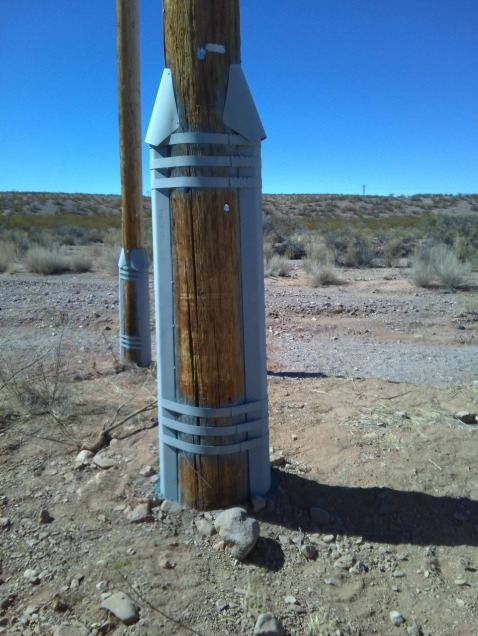T&D Times - April 2021
H-Frame Restoration: Real Situations and Custom Solutions
H-Frame Pole Restoration: Real Situations and Custom Solutions
With more than 55 years of pole restoration experience, Osmose is well suited to handle a variety of specialized restoration scenarios. Recently, Osmose was approached by two utility providers seeking custom solutions for H-frame transmission poles. Each of the following restoration examples demonstrates the wide range of adaptability of Osmose solutions.
 Project 1: Desert Environmental Erosion
Project 1: Desert Environmental Erosion
A southwestern utility had H-frame transmission poles located in a remote desert area. The customer reported structures at risk of reduced foundation capacity due to environmental erosion which had caused several feet of soil loss surrounding these structures. Osmose worked jointly with the utility’s engineering team on the best solutions to mitigate risk.
Osmose Custom Hardware Solution
Each pole of the H-frame transmission structures was assessed for length, class, and current conditions such as remaining embedment depth, lean, and current soil surroundings. Based on these findings, Osmose determined that each pole would receive custom steel truss solutions of either 17 or 20 feet in total length, depending on the pole’s remaining embedment depth. These trusses were driven into the soil to 10 and 13 feet, respectively, which is approximately 5 feet past the butt of the embedded pole. Two trusses were installed per pole, one on either side, and permanently banded to the pole above ground to firmly affix the foundation improvement solution to the in-service pole. Working closely with the utility, Osmose was able to design and install a robust solution without the need for an outage that significantly reduced pole turn-over risk and increase the resiliency for the utility.
Despite these being custom solutions, Osmose was able to procure material, manufacture, process, and deliver all material necessary to the job site quickly and properly installed them with Osmose training personnel in a very remote area. This all was done for significantly less cost than structure replacement.
Project 2: Wetland Groundline Deterioration
Due to the remoteness of this utility’s assets in the wetlands of the southeastern United States, the utility uses aerial patrol inspections. Upon footage review, the utility identified significant deterioration of a critical structure and requested a follow-up in-person inspection of the structure using an Osmose wood pole inspector. The ground line inspection confirmed significant deterioration at the groundline which typically would require immediate replacement.
Compounding this issue, the region near this structure had experienced several major hurricanes and as a result, many of the transmission lines in the area were still under construction, leaving this line one of the only lines available to supply power to a major commercial port.
Osmose Custom Installation Solution
Working closely with the utility, Osmose formulated a plan to safely mobilize a crew and bring in special equipment (marsh master with a sled to carry all restoration materials, equipment, and tools). For extra precaution given the severity of the pole condition and significance of this project, the utility dispatched a third-party safety observer and a flex track vehicle with a grappler to support the pole while being restored. Osmose installed two 13-feet long C-Trusses per pole that provided the full restoration strength to the ground line zone to both legs of the structure.
This restoration did not require a custom truss product but, instead, required a highly specialized restoration installation procedure. An informed decision was made to use specialized equipment for the truss installation due to wetland location and the critical nature of these structures.
Working with Osmose allowed this utility to properly assess and minimize pole plant risk on an expedited timeline, going from identification of the issue to installation of restoration in less than one week.
.png?width=243&name=Osmose-logo-(white).png)